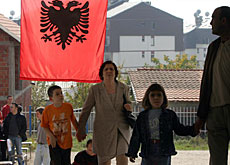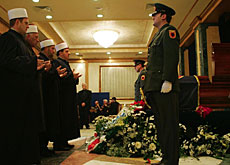Swiss hope for progress on Kosovo

Switzerland has again called on both sides involved in talks on the future of Kosovo, which restarted in Vienna on Friday, to work towards a lasting solution.
The comments came after a meeting between Swiss Foreign Minister Micheline Calmy-Rey and the United Nations Special Envoy for Kosovo, Martti Ahtisaari.
The session in Austria was the second round of talks between Serbian and ethnic Albanian officials after a preliminary round in February ended with no agreement.
Friday’s discussions focused once again on the thorny issue of local government. They were marred at the outset by Serb objections to the presence of a former guerrilla leader Belgrade accuses of terrorism.
The Serbs submitted a formal protest to Ahtisaari over the Kosovo Albanian delegation’s choice of former rebel commander Hashim Thaci as leader, saying he was being investigated for war crimes by Belgrade.
Speaking after the talks ended with no clear deal on Friday, the United Nations mediator who chaired the session, Albert Rohan, said the discussions had nevertheless been constructive.
Some progress had been made on allowing links between the Serb minority and Belgrade, he added.
But Rohan, who is Ahtisaari’s deputy, acknowledged that there were still “profound differences” between the two sides.
The next talks are due to take place next month.
Swiss discussions
The state of the Kosovo negotiations had formed the main topic of the meeting between Calmy-Rey and former Finnish President Ahtisaari, which took place in the Swiss capital, Bern, on Thursday.
“Switzerland has a strong interest in political and economic stability in Southeast Europe and in Kosovo in particular,” said the foreign ministry in a statement issued afterwards.
“The region is therefore a focal area of Swiss foreign policy.”
The statement reiterated that Switzerland called on both sides to work constructively towards a lasting solution to the dispute.
Last spring Calmy-Rey announced that Switzerland favoured a form of independence for Kosovo – only one of a few western countries to do so. However, her comments were not welcomed by Belgrade.
Unclear future
Kosovo has been run by the UN since Nato drove out Serb forces in 1999, but its future remains unclear.
Ethnic Albanians, who comprise around 90 per cent of the province’s two million population, want Kosovo to gain full independence from Serbia. But Belgrade wishes to retain at least formal control over the region.
Calmy-Rey and Ahtisaari also discussed possible fields of cooperation, particularly in the areas of protection of minorities and local administration.
Switzerland also wants to contribute expertise in the areas of democracy, federalism and the protection of minorities to the Kosovo reform process, according to the statement.
The second round of Vienna talks will not deal with the independence issue directly. But it will consider local government reforms aimed at giving Serbs more say in the areas where they live and possible links to Belgrade.
Experts say any form of independence for Kosovo would be conditional on its reforming local government and respecting its minorities.
swissinfo with agencies
There are 370,000 immigrants from the former Yugoslavia in Switzerland, of which 36% are from Kosovo.
Since 1999 Switzerland has given around half a million Swiss francs in aid to the region.
The Swiss army has taken part in the Nato peacekeeping mission since the end of the war.
Switzerland has also declared its support for a form of independence for Kosovo and deemed the issue a focal area of its foreign policy.
Kosovo:
Population: 1.9 million
Ethnic Albanians: 91%
Serbs: 5%
Other minorities: 4%
Unemployment rate: placed at 40%-80%
Poverty rate: around 50%

In compliance with the JTI standards
More: SWI swissinfo.ch certified by the Journalism Trust Initiative











You can find an overview of ongoing debates with our journalists here . Please join us!
If you want to start a conversation about a topic raised in this article or want to report factual errors, email us at english@swissinfo.ch.